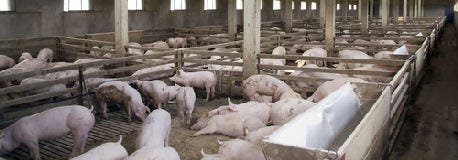
The National Pork Producers Council is keeping trade on the front burner this month as organization officials look to mitigate the effects of a Chilean trade safeguard and USDA's Country of Origin Labeling proposal while monitoring negotiations on the Transatlantic Trade and Investment Partnership.
In a press call Thursday, NPPC President Randy Spronk, Edgerton, Minn., said the top three issues – Chile, COOL and TTIP – are vital to the health of the U.S. pork industry due to the sheer volume of pork that is exported each year.
In 2012, Spronk said, the U.S. exported $6 billion worth of pork to more than 100 nations, accounting for 27% of production.

The National Pork Producers Council has several trade-related issues to tend to ahead of G8 Summit and WTO action on COOL
Though not a top importer, NPPC Vice President and Counsel for International Trade Nick Giordano said Chile still represents a key market for U.S. pork. The country's recent trade safeguard, implemented late last month, essentially claims that U.S. pork is hurting the domestic market for Chilean pork, Giordano said.
However, he pointed out that the group has hired a local counsel to make the case for pork trade.
"I'm confident that if we get a fair shake in Chile, we will exonerate ourselves," Giordano said. Chile only imports about 5% of their pork, and have a rather large export market, he explained.
In addition to Chile's trade issues, the council is lobbying for elimination of trade barriers through the United States' TTIP negotiations with the European Union. The U.S. is expected to launch formal negotiations next week ahead of the G8 Summit.
According to Iowa State University economist Dermot Hayes, about 17,000 new jobs would be created in the U.S. based on projected exports to the EU, NPPC said. Last year, the U.S. exported more pork to Honduras than it did to the EU – a figure that is quite concerning, considering the EU is the number two pork market in the world.
~~~PAGE_BREAK_HERE~~~
"Pork producers have a huge stake in the TTIP negotiations," Giordano said. "We've got everything to gain."
Thursday's press call follows Spronk's in-depth discussion last week with industry officials and producers at the World Pork Expo regarding the TTIP negotiations. There, he noted that sanitary and phyto-sanitary issues are largely to blame for limited U.S. access to EU markets.
The same week NPPC was presenting its position on the TTIP, Canada released a list of proposed items that could be subject to increased tariff and other trade barriers if the USDA's Country of Origin Labeling rules aren't up to snuff with World Trade Organization specifications.
The issue stems from USDA's recent revisions of the labeling provisions, which were meant to increase WTO compliance. Canada and Mexico, however, maintain that even with the revised provisions, labeling on certain products sways consumers toward domestic products and hurts trade.
The organization has previously said it supports labeling, but only in terms that Mexico and Canada are pleased with.
"Our greatest concern is the potential for retaliation," Giordano said. Though both countries have released lists of products to be potentially used as retaliatory measures, they currently have no right to retaliate, Giordano said.
First, the WTO must determine if the new rule as submitted by the USDA is acceptable under WTO rules. That process could take a year or more. If WTO rules U.S. regulations are still unsatisfactory, then Mexico and Canada have the option to petition the WTO for formal retaliation.
"The U.S. pork industry, pork producers are very concerned, and we want the U.S. to come into compliance with WTO rules," Giordano explained.
More on COOL:
WTO COOL Review Could Be Telling for Trade
Proposed COOL Changes Met With Mixed Reaction
Coalition Submits COOL Letter To Vilsack
Groups Outline Options for COOL Compliance
COOL Ruled Non-Compliant With WTO Agreement
About the Author(s)
You May Also Like




